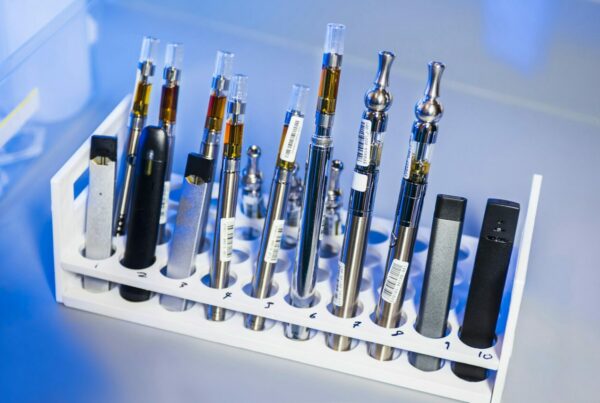N, N-Dimethyltryptamine (DMT) is a substance commonly found in various plants and animals, known for its potent yet short-lived psychedelic effects upon ingestion.
Mounting evidence indicates that DMT, which naturally exists in the human body, plays crucial roles in both the peripheral and central nervous systems and might serve as a neurotransmitter.
DMT triggers strong psychedelic experiences, but it usually doesn’t cause many negative side effects, except for potential cardiovascular problems when high doses are injected.
Let’s explore DMT and its variety of roles. These roles range from recreational usage to its promising potential in scientific exploration and therapeutic use.

A Brief Introduction to DMT: What is it?
| Aspect | Details |
| Name | N, N-Dimethyltryptamine (DMT) |
| Classification | Indole alkaloid |
| Occurrence | Found naturally in a variety of plants and animals |
| Psychoactive Effects | Induces brief, intense psychedelic experiences upon consumption. |
| Method of Consumption | Can be inhaled, injected, or ingested orally. |
| Duration of Effects | Short-term effects, generally lasting between 5 to 30 minutes. |
| Chemical Structure | Comprises a tryptamine core with two methyl groups attached to the nitrogen atom of the amine. |
| Metabolism | Rapidly metabolized by the body, decomposed by monoamine oxidase (MAO). |
| Cultural Use | Historically used in various ceremonial and shamanistic rituals by indigenous cultures. |
| Other names | Dimitrifantasiabusinessman’s tripBusinessman’s special45-minute psychosisspiritual molecule |
The Role of DMT in Mental Health
N, N-Dimethyltryptamine (DMT), a compound famous for its powerful psychedelic effects, is garnering attention for its potential benefits to mental health. Despite its conventional association with intense visionary experiences, recent research suggests a connection between DMT and mental wellness.
Effects on Psychological and Emotional Well-being
DMT’s psychedelic effects, known for eliciting deep emotional responses and altering states of consciousness, could potentially pave the way for therapeutic approaches to mental health challenges. These effects could assist in emotional processing and offer new perspectives on personal traumas.
Brain Function and Neuroplasticity
Research suggests that DMT might have an impact on neuroplasticity, enhancing the brain’s ability to adapt and reorganize. Investigating its influence on synaptic plasticity and neural connectivity could potentially yield treatments for disorders related to neural dysregulation.
Potential Therapeutic Applications in Mental Health Disorders
Early research underscores the potential of DMT in treating disorders such as depression, addiction, and PTSD. Its ability to induce mystical or spiritual experiences could provide an unconventional way for psychotherapy and aid in revising negative thought processes.
Insights into the natural presence of DMT within the body highlight its significance in psychological resilience, stress responses, and overall mental health. Understanding how the body regulates DMT levels internally might pave the way for innovative therapeutic strategies.
DMT’s Role in Mental Health Disorders
| Mental Health Disorder | Description | Effectiveness of DMT | Potential Benefits |
| Depression | A mood disorder typified by enduring sadness, loss of interest, and decreased motivation | Preliminary studies suggest DMT might help alleviate symptoms by inducing deeply emotional experiences. | Its rapid onset and ability to trigger transformational experiences might provide innovative therapeutic techniques for reshaping negative thought patterns and enhancing emotional processing |
| Post-Traumatic Stress Disorder (PTSD) | A mental health disorder triggered by traumatic events leading to flashbacks, intense anxiety, and intrusive thoughts | Initial research indicates DMT’s potential to manage symptoms by inducing spiritual or mystical experiences that could help patients reshape traumatic memories | DMT’s potential to induce altered states of consciousness could facilitate emotional processing and offer a fresh perspective on traumatic experiences |
| Addiction | A complex disorder characterized by compulsive engagement in rewarding stimuli despite adverse consequences | Some research suggests DMT might play a role in breaking addictive patterns and reducing substance cravings | DMT’s capability to trigger intense and transformative experiences could help individuals modify their behavioural patterns and confront their addictive tendencies |
Approaches to Using DMT
DMT, renowned for triggering short yet powerful psychedelic experiences, can be administered in a number of ways. The chosen method often depends on the desired intensity and length of the experience.
Inhalation:
When inhaled through a pipe or vaporizer, DMT requires careful temperature management to avoid overheating and burning the compound. The psychedelic experience commences almost instantly when DMT is inhaled, typically lasting from 5 to 15 minutes.
Oral Consumption:
Taking DMT orally leads to slower onset effects which persist notably longer, often for several hours. This is due to the slower metabolic breakdown of DMT when combined with an MAOI.
Intravenous Use:
DMT can be directly injected into the bloodstream for immediate and potent effects.
This method results in an immediate and intense experience, but it necessitates precise dosing and carries higher risks.
Insufflation (Snorting):
Inhaling DMT via the nasal route leads to a slower onset of effects compared to inhalation, but it can yield a more prolonged experience.
Sublingual or Buccal Administration:
When absorbed through the tissues in the mouth, this method provides a smoking alternative and delivers a longer, though less intense, experience.
Determining Therapeutic Dosage: N, N-Dimethyltryptamine (DMT)
For inhalation, the suggested dosage ranges from 20 to 40 mg, while for intravenous administration, the recommended dosage is 0.2 to 0.4 mg per kg of body weight. These dosage guidelines are primarily intended for clinical research and are particularly relevant for intravenous application.
- Higher intravenously administered doses are associated with intense visuals, temporary loss of control, and a combined state of anxiety and euphoria
- Intriguingly, lower doses have demonstrated less desirable effects
- Recreational doses of inhaled DMT typically vary from 40 to 50 mg, sometimes even reaching as high as 100 mg
- Different intravenous doses Users of DMT (7, 14, 18, and 20 mg solutions) who have experienced near-death phenomena have reported lasting and positive enhancements in their psychological health.
Availability of DMT
ProductsOsmosis – 4-ACO-DMT Ethereal Essence Tincture
This tincture, containing a variant of DMT known as 4-Acetoxy-N, N-dimethyltryptamine (4-AcO-DMT), is intended for oral use. As liquid extracts, tinctures like this one could offer a distinct experience compared to regular DMT.
Lucid Supply Co. – 5-MeO DMT Vaporizer
This product is a vaporizer containing 5-Methoxy-N, N-dimethyltryptamine (5-MeO-DMT). It is celebrated for its intense, transformative, and often fleeting experiences, with 5-MeO-DMT as its active compound.
Integral Alchemist – Acacia – 1ml DMT Vape Cartridge
Offered by Integral Alchemist, this DMT vape cartridge is pre-filled with N, N-Dimethyltryptamine. It’s aimed at users who value a discreet and convenient DMT consumption method.
Deadhead Chemist – 5-Meo-DMT Cartridge
This cartridge holds 5-Methoxy-N, N-dimethyltryptamine (5-MeO-DMT), a substance noted for its deep and powerful effects.
Anticipated benefits for mental health might include personal growth, spiritual experiences, or therapeutic applications designed to enhance emotional wellbeing.
Deadhead Chemist – N, N DMT Cartridge
Another offering from Deadhead Chemist, this cartridge is filled with the classic N, N-Dimethyltryptamine. Such cartridges present an accessible way to consume DMT, providing a more controlled and consistent experience.
Concluding Remarks
The consumption of N, N-Dimethyltryptamine (DMT) in
What are the differences between various DMT products on mental health?
For instance, vaporizers may induce swift effects, whereas tinctures or vape cartridges might provide more steady and predictable dosages.
Incorporating derivative compounds or 5-MeO-DMT may result in varied intensity levels and diverse mental health effects.
These nuanced differences underscore the importance of selecting a DMT product that aligns with individual preferences and mental health goals.
Can DMT foster enduring changes in mental health and personal growth?
There is anecdotal evidence that suggests DMT-induced experiences could lead to long-term improvements in mental health and personal development.
Profound or transformational encounters, such as those resembling near-death experiences, are frequently associated with accounts of sustained positive shifts in psychological well-being and personal evolution.
Despite these experiences being intense and transient, they often trigger introspection, spiritual revelations, and a sense of unity or enlightenment.
Individuals frequently report a rejuvenated perspective on life, enhanced emotional resilience, and an amplified appreciative outlook towards life after these experiences.
What’s the best strategy for employing DMT for mental health purposes?
It’s crucial to make informed decisions, which entails thorough research and comprehension of the compound’s effects.
Advice from mental health professionals or seasoned users can provide valuable insights into potential risks and advantages.
Recognizing personal tolerance and mental preparedness is also essential, in addition to ensuring a supportive and safe setting for the experience.
How does DMT stack up against other psychedelic treatments such as psilocybin or LSD in mental health therapy?
DMT varies from other psychedelics like psilocybin or LSD in terms of its effects, duration, and intensity.
Highly intense, short-acting psychedelics like DMT necessitate unique therapeutic methods in mental health care, different from those applied to longer-lasting psychedelics.
Recommended Additional Reading:





